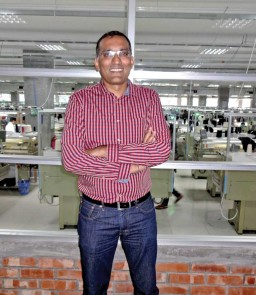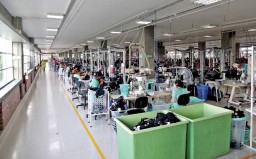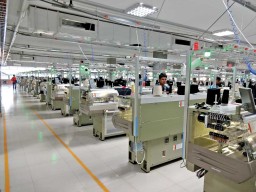
The focus on building operational excellence and skilling the operators for improving output and quality levels, which is most important for ensuring a profitable sustenance of one’s business, is still missing from Bangladesh, mostly due to the unidirectional focus of the industry towards capacity expansions for enhancing production. SQ Group’s sweater division, SQ Celsius is probably the only company which has expanded through automation and by bringing in systems to improve productivity in its efforts to developed sustainable manufacturing processes and ensuring the health and safety of its workforce. With two facilities for sweater manufacturing on the outskirts of Dhaka, in Mawna and Valuka, SQ can be placed among the five biggest sweater manufacturers of the country, with a setup of 750 automatic flat knitting machines, 800 semi-automatic flat knitting machines and 2000 hand flat knitting machines. Spearheading the sweater operations of the US $ 350 million SQ Group, Rajesh Tatineni, COO, SQ Celsius has been instrumental in many recent initiatives of the company from adding automatic flat knitting machines to going green.
“Currently, growth is coming from the sweater business moving out of China, even as the market in Europe is not expanding anymore due to stagnant population growth and hence the future growth will come from other populated regions like Central and South Asia.” – Rajesh Tatineni, COO, SQ Celsius
Ghulam Faruque, the founder and chairman of SQ Group started the first sweater manufacturing facility in Mirpur in 1993, with around 160 hand flat knitting machines and it was only in 2002 that SQ shifted its manufacturing base to the state-of-the-art facility SQ Celsius in Mawna, being among the first companies back then to establish manufacturing facilities outside of Dhaka city. “The 12 years old facility is still our flagship manufacturing unit not only because of its sustainable and green structure but also because of its capabilities to manufacture some of the most critical styles of sweaters,” avers Rajesh, who has been with SQ Group since 2010. “One of the most commendable aspects of our sweater facility in Mawna has been the low monthly attrition rate of just 5%, which is excellent if you compare it with other companies in the region,” he adds. Due to such a minimal attrition rate and ongoing training programs, the operators have achieved remarkable skill levels and the facility is able to manufacture 60 different sweater styles per month in all types of yarns and gauges. SQ Group’s biggest client is H&M, acquiring more than 50% of its capacity. The company also works with brands like Marks & Spencer, Esprit and Sainsbury, offering FOBs in the range of US $ 3.5 to 25.

SQ brought its first set of automatic flat knitting machines in 2012 from Shima Seiki and Stoll along with few Chinese machines for experimentation. Presently the company has 300 machines from Shima Seiki and 450 machines from Stoll. “We handle numerous styles in significant volumes, and for making the best products you need the best machines,” shared Rajesh. The company has plans of installing a total of 1500 automatic flat knitting machines. However, unlike 99% of the sweater manufacturers, who are now downsizing their hand flat knitting machines after installing automatic machines, SQ Group doesn’t want to create a pool of unemployed hand flat knitting operators who can’t find work in any sweater factory.
To retain its work pool, the company started replacing its hand flat machines with semi-automatic flat knitting machines of Chinese built, wherein the 15,000 to 20,000 to-and-fro movement of the machine carriage has been automated, leaving the operator to just tie the knots in the yarns to create the design. “This makes it possible for the same hand flat machine operator to handle more machines and check the quality of the panel in real time, with a week’s training,” says Rajesh. Spearheading the company’s initiatives towards human resource development and employee engagement, Warisul Abid, Chief People Officer, SQ Group states, “The workers are paid on monthly basis and taken through career development plans to become supervisors and technicians.” Another intervention done by the company has been reducing the number of working days from seven to five, with Thursday and Friday as off days. “This has helped us reduce the operating costs, the operators have become more efficient and productive, while earning similar or even larger amounts by working for lesser hours,” explains Abid. The factory runs in two shifts of 10 hour each and day & night shifts of workers are changed every week.

The air-conditioned knitting floor at SQ Celsius has 750 automatic knitting machines segregated as per their make, and yarn cones as per the day’s target are stacked on racks adjacent to the knitting machines, reducing the style changeover time and operator waiting time. Furthermore, the view of the shopfloor is such that the traffic lights installed on each and every knitting machine are visible to not only the production staff but also to Rajesh himself, which accelerates the pace of machine maintenance while reducing the machine downtime. SQ is operating at the national average of 1:4, wherein a single operator handles four machines and is looking at achieving the Chinese benchmark of 1:8, which the company believes is just a matter of time. With so many expansions in place SQ Celsius has not bereft its units of manufacturing excellence and has set-up lean linking lines for sweaters, wherein the linking, inspection, finishing and packing operations happen in a sequential manner all in a single line. “Ours is the only P2P (Panel to Pack) line in the world for sweater manufacturing,” avers Rajesh. Such formation of the linking department increased the efficiency by 10%, compared to the usual formation of the department. The lines start with the linking operations done on automated linking machines from the Italian company Exacta, which guarantee 30% more output than the commonly used linking machines of Chinese make. The machines have been able to overcome the problem of low elasticity in the linked seam via its patented mechanism and are able to do overlocking, linking and yarn trimming as a single operation, doing the combined job of three people. The machines are suitable for matching stripes and other such patterns in sweaters.
With 16 tonnes of daily in-house yarn dyeing and processing capacities, SQ Group is dependent on sourcing fancy and textured yarns from China. Despite the robust supply chain of Chinese spinning mills, 20 days are added to the lead times of SQ Group, when compared to a Chinese sweater factory.
Followed by the linking machines are the lamp inspection, pressing of knitwear, final inspection and lastly the packaging operations. Rajesh believes that ironing a sweater with hand irons can ruin the sweater entirely. Hence, SQ has installed upsteam ironing tables for pressing of sweaters, which provide steam to the garment followed by the vacuum suction, removing the excess steam from the garment, which can cause the sweater to smell after a certain time. The process of idling, steaming and suction can be timed and is controlled by the timers present in the machines for achieving consistency in finishing. These tables save on the time and effort wasted in drying the sweaters of the excess steam. The tables with a dimension of 1800 mm X 900 mm are wider than the usual ironing tables (1300 mm X 800 mm), hence a complete sweater can be accommodated easily at one time on the table. Besides improving the productivity of the pressing operator, the machine doesn’t need skilled operators for operating proficiently. After being linked and finished in the linking lines, the sweaters are washed in a centralized washing facility, followed by label, zipper and button attachment. Before the final packing, the sweaters are again ironed and inspected.
Since all the existing facilities of SQ Group are being converted to green factories and even the upcoming facilities are being established with the same thought process, SQ Celsius is also being renovated to be certified as a platinum rated green project. The air-conditioning of the plant is being run by recycling the exhaust gases from the generators, wherein the exhaust gas outlet has been connected to a chiller plant, which has got lithium bromide and this converts the exhaust gases into steam and then energy for the air-conditions. “We spent a million dollars on this but then the energy savings on the air-conditioning are near about 30% and to achieve platinum rating you need to achieve energy savings of 20%,” explains Rajesh. SQ has plans of converting all its existing plants to green factories by the end of 2015.
With an expectation to touch the annual turnover mark of US $ 40 million this year, SQ Celsius already has plans in place to ensure achievement of US $ 80 million by 2015.“With the same setup we plan to touch the mark of US $ 100 million by 2016 and the focus would be on moving up the value chain by focussing on the products, lead times and our sustainable aspects as an apparel manufacturer, because we want the buyers to pay us what they are paying in China, because we are equally proficient at sweater manufacturing,” concludes Rajesh.






